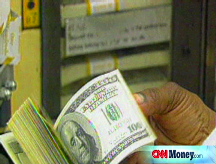The long and winding recession
Ben Bernanke and Warren Buffett both hint that economic pain will linger for some time. But they also see some faint glimmers of hope ahead.

NEW YORK (CNNMoney.com) -- The market's up one day and down the next. Oil rises and oil falls. The dollar strengthens and then it weakens.
This has been a topsy-turvy market for the past few weeks. And it seems that the only thing traders can agree is that the sluggish economy is to blame.
Regardless of what direction stocks, commodities or the dollar move on any given day, the sad state of the economy is invariably cited as the reason.
Oil's down and stocks are up? It's demand destruction! Crude's spiking again and stocks are falling? It's because the credit crunch is worse than feared and the commodity bulls are back!
Sure, some of the wacky market moves this month can be attributed to light trading volume as many Wall Streeters appear to be hitting the beach. But these are confusing times for investors. It's difficult to figure out when the economy will finally start to emerge from this funk.
Federal Reserve chairman Ben Bernanke, speaking at a conference in Jackson Hole, Wyo. this morning, admitted that "the financial storm...has not yet subsided."
And because the credit crunch is coupled with a global boom in commodity prices, Bernanke said this is "one of the most challenging economic and policy environments in memory."
Bernanke added that the Fed has kept interest rates relatively low despite the increase in inflationary pressures because the Fed believed that slowing global growth would eventually lead to a pullback in commodity prices.
That has begun to happen in the past month. Bernanke said in his speech that the drop in oil prices and the strengthening of the dollar is "encouraging" and that inflation "should moderate later this year and next year."
However, Bernanke also pointed out that a key reason why inflation will moderate is that the pace of economic growth "is likely to fall short of potential for a time."
My takeaway from this speech is that barring a major shock to the economy, such as a huge bank failure or another big spike in oil prices, the Fed is going to keep interest rates where they are for a while...perhaps well into next year.
In other words, consumers and investors will have to get used to this economic uncertainty. It's likely to linger.
The Fed has no quick and easy fixes to the dual problems of the credit crunch and inflation. It's going to take time for the Fed's seven rate cuts from last year and earlier this year, to work their usual stimulative magic.
This doesn't mean that the economy, as some pundits and many of this column's most vocal readers seem to think, is heading for another Great Depression.
But it does probably mean that the markets will remain fairly volatile for the next few months.
To that end, legendary investor Warren Buffett said in an appearance on CNBC this morning that he thought the economy may be worse five months from now but it would be stronger five years from now. He also said that stocks are more attractive now than a year ago.
Yes, this may turn out to be a longer recession, slowdown, or whatever term you want to use to describe the current state of the economy, than usual. As I pointed out in a column a few weeks ago, the typical post WWII recession lasts about 10 months. But some have lasted as long as 16 months.
Still, now more than ever, is a time to resist the temptation to fret about day-to-day market moves and doom and gloom economic headlines. For those that are able to put some money aside to invest in quality U.S. companies, now is an opportune time to do so.
The short-term outlook may be bleak but this is not the beginning of the end for the U.S. economy. It's a cyclical downturn, plain and simple. And as long as oil prices keep falling and the dollar keeps rebounding, there's good reason to think that we're closer to the end of the slump than the beginning. ![]()




